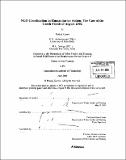NGO coordination in humanitarian action : the case of Czech floods of August 2002
Author(s)
Kumar, Pankaj, 1979-
DownloadFull printable version (4.030Mb)
Alternative title
Non-Governmental organization coordination in humanitarian action
Other Contributors
Massachusetts Institute of Technology. Dept. of Urban Studies and Planning.
Advisor
JoAnn Carmin.
Terms of use
Metadata
Show full item recordAbstract
In responding to disasters and emergencies, it is generally expected that there is effective coordination and exchange of information among those affected by or involved in the disaster response at the national and international level and that relief agencies undertake activities on the basis of need, where their expertise and capacity can have the greatest impact. Benefits of coordination range from reducing activity duplication to allowing organizations to assist more people in need. However, while the importance of coordination is generally accepted and appreciated in the humanitarian aid field, how to accomplish it still remains somewhat elusive and problematic. This thesis attempts to analyze the nature and level of coordination among Czech humanitarian NGOs responding to the devastating floods of 2002 with a view to better understand the challenges to and incentives for NGO coordination in humanitarian action and response. The results show that while an ad-hoc attempt was made to coordinate the rehabilitation effort among the NGOs, differences in management styles and organizational values, along with traditional disincentives to cooperate like competition for funds and publicity limited the level of coordination in responding to the floods.
Description
Thesis (M.C.P.)--Massachusetts Institute of Technology, Dept. of Urban Studies and Planning, 2005. Includes bibliographical references (p. 56-59).
Date issued
2005Department
Massachusetts Institute of Technology. Department of Urban Studies and PlanningPublisher
Massachusetts Institute of Technology
Keywords
Urban Studies and Planning.